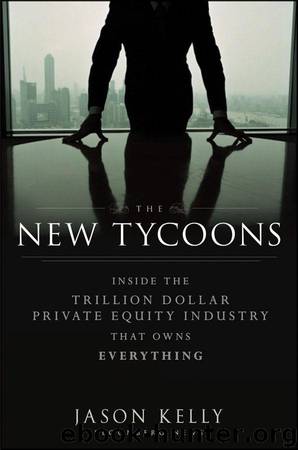The New Tycoons: Inside the Trillion Dollar Private Equity Industry That Owns Everything (Bloomberg) by Kelly Jason

Author:Kelly, Jason [Kelly, Jason]
Language: eng
Format: azw3, mobi
Publisher: Wiley
Published: 2012-08-01T16:00:00+00:00
The ops function and the executives it draws help dilute the recovering investment banker vibe at many private-equity firms, balancing the Ivy League pedigreed smooth-talkers with executives who have been in the proverbial trenches. True, many of them supplemented undergraduate degrees in science with MBAs and stints at management consulting firms, but many say their ability to apply their own experience gives them an advantage over someone who has just looked at Excel spreadsheets and case studies.
At KKR, Capstone was created in 2000 and is still run by Dean Nelson, a Purdue University-trained chemist who went on to get an MBA at the University of Chicago. He proceeded to work at Boston Consulting Group, considered along with McKinsey & Co. and Bain & Co. to be one of the top consulting shops, and Shell Oil.
KKR’s initial ops effort several years before was to use a third-party consulting firm, headed by Steven Burd, who had worked at Arthur D. Little. Burd and a small staff acted as consultants, especially on KKR’s string of grocery deals in the 1990s. He eventually went to Safeway as president and then CEO. In his absence, the operations consulting business faded away. As the decade wore on, Kravis and Roberts knew they needed to revisit the idea, as part of the broader effort to reinvent the firm. They set out to find someone to run a new operations group that would be an official part of KKR instead of an outside firm.
Nelson was living in Chicago and working for BCG when he got a call from a headhunter at search firm Spencer Stuart about a job at KKR. Nelson was intrigued, especially because his job in consulting had evolved into a lot of administration and new business generation, and little actual consulting. He also came to learn that KKR was serious, and came to appreciate the urgency. “The late 1990s were not a good time for the firm,” he said. “Buying smart and making some basic changes to the operations of the company weren’t going to be enough anymore.”
KKR at the time was small, with a total of 14 partners. The firm had purposefully avoided hiring people in the middle of their careers. You either started at KKR and grew up there, or maybe got a job on the back end of your career as a senior adviser. Nelson went through two rounds with each of the partners, including a 90-minute meeting in November 1999 with Kravis in his library. Nelson returned to New York the next month during KKR’s annual firm-wide meeting. He spent the day in 45-minute chunks with all 14 partners, starting with breakfast with Roberts, arguably the toughest audience in the firm. Nelson said it was hard to tell what Roberts thought because “he plays it very close to vest.”
At the end of the day, KKR handed Nelson a case study of sorts—a deal they’d considered for Bic’s pen business—and told him to give them thoughts on it by the next morning. Once he got the job, Nelson had to figure out how his group was going to operate.
Download
The New Tycoons: Inside the Trillion Dollar Private Equity Industry That Owns Everything (Bloomberg) by Kelly Jason.mobi
This site does not store any files on its server. We only index and link to content provided by other sites. Please contact the content providers to delete copyright contents if any and email us, we'll remove relevant links or contents immediately.
| Private Equity | Valuation |
| Venture Capital |
The Black Swan by Nassim Nicholas Taleb(7129)
Bad Blood by John Carreyrou(6621)
Pioneering Portfolio Management by David F. Swensen(6300)
Millionaire: The Philanderer, Gambler, and Duelist Who Invented Modern Finance by Janet Gleeson(4478)
Skin in the Game by Nassim Nicholas Taleb(4248)
The Money Culture by Michael Lewis(4207)
Bullshit Jobs by David Graeber(4190)
Skin in the Game: Hidden Asymmetries in Daily Life by Nassim Nicholas Taleb(4006)
The Wisdom of Finance by Mihir Desai(3746)
Blockchain Basics by Daniel Drescher(3582)
Liar's Poker by Michael Lewis(3447)
Fooled by Randomness: The Hidden Role of Chance in Life and in the Markets by Nassim Nicholas Taleb(3124)
Hands-On Machine Learning for Algorithmic Trading by Stefan Jansen(3072)
Mastering Bitcoin: Programming the Open Blockchain by Andreas M. Antonopoulos(3042)
The Intelligent Investor by Benjamin Graham Jason Zweig(3041)
The Power of Broke by Daymond John(2986)
Investing For Dummies by Eric Tyson(2953)
You Are What You Risk by Michele Wucker(2835)
Bull by the Horns: Fighting to Save Main Street From Wall Street and Wall Street From Itself by Sheila Bair(2770)
